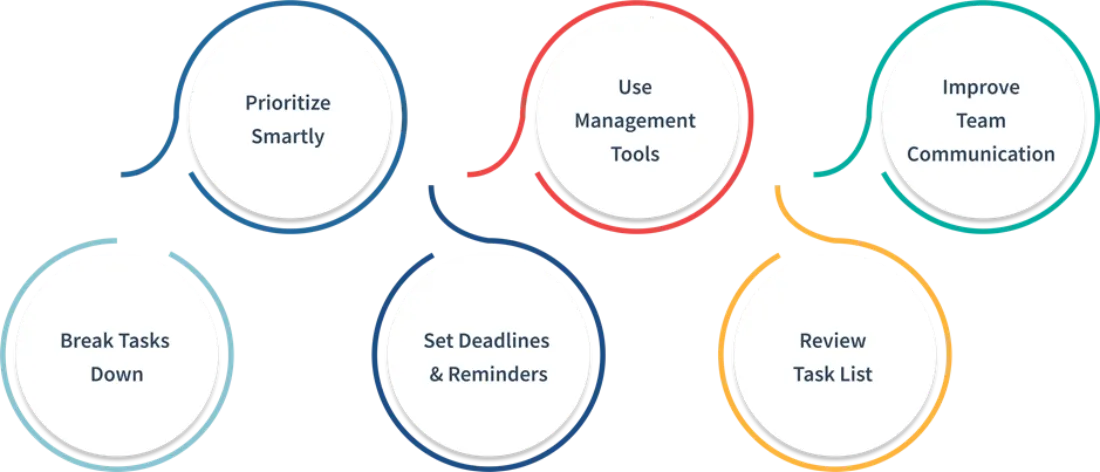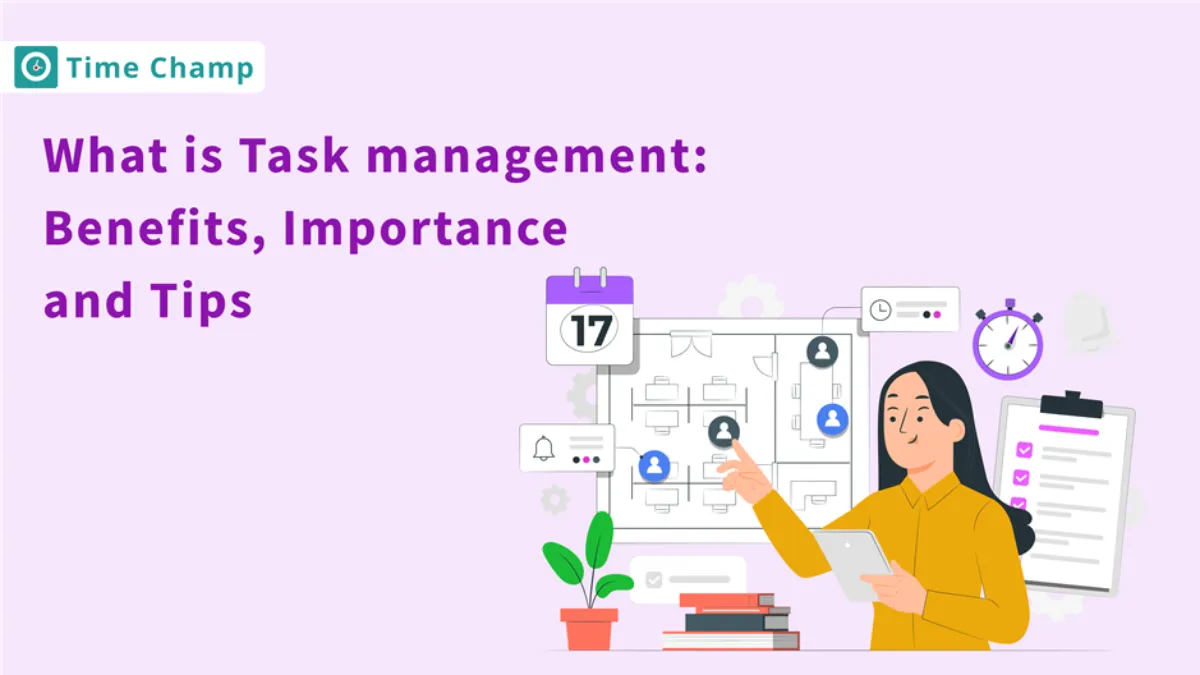Does your to-do list just continue to grow regardless of how much you work? However hard an individual may work, there is always something left undone- that is the way time works. Task management is the answer for keeping you and your employees in line, focused, and on top of all that you must get done.
It goes far beyond just crossing things off a list. It's all about understanding what tasks are required, when they're due, and who's in charge of doing them all while working as quickly and accurately as possible. In this blog, you will explore exactly what task management is, how it varies from project management, the benefits it provides, and the tactics that will help you keep your day-to-day operations on track.
What Is Task Management?
Task management involves creating plans, organizing work, deciding what’s important and monitoring progress throughout the completion of each task. Task management helps you keep track of every detail, from assigning tasks and setting priorities to tracking progress in real time and stay on schedule no matter what type of activity you’re handling.
Task management can be mastered by understanding how to delegate, divide tasks, fix deadlines realistically, and monitor the progress of the tasks after every step. Effective task management also prevents distractions, avoids stress and makes you complete tasks better. Task management helps both individuals and teams improve efficiency, decrease stress, and keep everyone focused on their shared goals.
How Task Management Differs from Project Management
Task management and project management could appear similar, but they differ in purpose when defining productivity.
- Task management divides projects into smaller tasks that can be acted upon to ultimately reach the end goal. Task management involves what needs to be done soon, who is responsible for it, and how it is tracked.
- Project management does include a much broader scope of duties. It includes the planning, organization, and management of all parts of a project. A project generally includes multiple tasks, deadlines, and phases that work together toward a common goal.
Task management is an important part of project management but is not the same. Being able to separate them enables individuals and teams to maintain focus on long-term goals as well as daily tasks.
Why Is Task Management So Important?
Effective task management can be supportive in enhancing organization values, bringing clarity to individuals and teams so that they can work with more confidence and with more efficiency. An organized approach to tasks makes it simpler to decide which work comes first, meet deadlines, and keep your productivity strong. It gives you peace of mind by setting out small steps and ensuring you won’t miss any important details. Using a task management tool, teams can work seamlessly, stick together, and notice progress and possible problems more easily. In addition, managing tasks means outlining the work, choosing the best way to use resources to avoid delays, and assigning clear responsibility to each individual or team. It helps the team adjust when priorities change, set clear marks for seeing growth, and organize daily tasks with the company’s main aims. If task management is lacking, work gets out of control, deadlines are not met, and teams struggle to cooperate; that’s why task management is important for business growth.
Key Benefits of Task Management
Task management is crucial towards ensuring that teams are organized, focused and on track. It provides an effective workflow from beginning to end, resulting in improved results with minimal effort.

Increases Productivity and Efficiency
Good task management helps development in productivity and efficiency because it keeps individuals on top of their work. If the job is allocated and managed, the team won't have to spend more time getting to the next step. It makes everyone works more smoothly, saves time, and minimizes potential misunderstandings. Managing tasks this way makes progress seem natural and easy because the goals are small and easy to handle. Therefore, employees can handle more tasks in less time, with fewer disruptions, which results in noticeably better output.
Better Teamwork and communication
With good task management, teams work better because each person understands their responsibilities and recognizes how their role contributes to the overall objective. Assigning tasks with deadlines and clear expectations allows team members to support each other and avoid any mistakes. Because task management tools have features for sharing comments, work status, and dashboards, people don’t need to communicate about projects by attending so many meetings or writing so many emails. When things are clear and simple, everyone trusts one another and can work together, which leads to quicker completion of objectives.
Reduces Chance of Missing Deadlines
Task management helps prevent missed deadlines by organizing tasks, assigning clear purpose, and defining precise timelines. If tasks are scheduled and tracked, it becomes easier for teams to detect possible delays and act on them in a timely manner. Using progress markers and reminders helps prevent anything from getting missed. When projects are divided into simple tasks and clear responsibility is given, the whole team understands their roles and when to finish them. Acting in advance prevents late rushes, lowers stress levels, and ensures all significant deliverables meet the deadline as promised to customers.
Improves Project Visibility
Task management makes it easier to understand the entire project by outlining each task. When all tasks are organized in one place, whether in a list, board, or timeline, it becomes easy for everyone to see what’s happening at any moment. This visibility assists managers in monitoring progress without micromanaging and enables them to see how their efforts contribute to the overall objective. It also simplifies the detection of delays, the resolution of blockers earlier, and keep projects moving smoothly and increased visibility.
Task Management Mistakes to Avoid
Even the most organized teams can face challenges and struggle with task management. Uncertain goals, inconsistent discipline and a poor structure can slowly impact how productive an organization is. If employees pay attention to their work tasks and recognise problems as they develop, stress will be reduced and keeps work running smoothly. It is critical to understand what you should avoid and what to do.
Poor Planning and Prioritization
Rushing to complete tasks without careful consideration usually leads to confusion, wasted effort, and failure to meet deadlines. If you don’t prioritize your tasks properly, you could miss some critical issues while focusing on less important ones. Management of tasks begins by establishing what is essential and using the appropriate amount of time and resources.
Micromanagement and Delegation Issues
When members of the team attempt to handle every detail by themselves, this may slow down progress and morale. On the same note, micromanaging by managers also results in lower confidence and motivation within the team. Conversely, when work is assigned to the wrong person or instructions are not clear, then the overall efficiency decreases. You should also trust your team and assign work according to the abilities and skills of each team member.
Overload and Burnout
Rushing employees with overly difficult tasks or giving them short deadlines often ends in burnout. As a result, people become less productive, and it negatively affects both team morale and staff retention. Success in business is only feasible when work is effectively handled, and attainable goals are set.
Distractions and Lack of Monitoring
When you do not check in regularly, you might forget or miss some tasks. Despite having the best plans, distractions caused by poor planning, vague goals or missing tools can still stop you on the way to your goal. Ongoing updates and using suitable tools explain the goals and hold you responsible.
Best Practices for Effective Task Management
Efficient task handling depends on clear, easy-to-follow and consistent practices. If you use the right method, it becomes simpler to organize your tasks, concentrate and meet deadlines. These are the best ways to improve your task management.

Break Down Large Tasks into Smaller Steps
Large tasks feel overwhelming, and it is hard to begin. Breaking them down into independent, separate steps ensures the work is less daunting and easier to accomplish. In doing this, there is gradual progress, improved comprehension, and the sense of accomplishment for every smaller assignment. It also allows for early detection of problems and assigns tasks more effectively.
Prioritize Tasks Wisely
Since time and resources are limited, it's important to prioritize task effectively. Start with the most important and urgent tasks and address them first. Use methods like the Eisenhower Matrix or ABC prioritization to efficiently classify tasks. Prioritization effectively saves time on low-impact tasks while allowing for the completion of critical tasks within a realistic timeframe.
Set Realistic Deadlines and Reminders
Unrealistic deadlines cause unnecessary stress and rushed work, which reduces quality. Estimate roughly how long the work will last and leave some buffer for unexpected holdups before setting a deadline. Reminders keep everything on track and prevent things from falling through the cracks. This balance maximizes productivity without burnout.
Use Task Management Tools
Tools such as Time Champ, Trello, Asana, or monday.com help you manage, assign, and track tasks in one place. They help people collaborate, meet deadlines, share files, and report their progress, so they are perfect for personal or group work. They keep information organized and streamline communication.
Regularly evaluate and update the task list
A task list is not a setup item to be overlooked. Projects evolve, priorities move, and new activities develop. Regular check-ins guarantee that your work list remains relevant to your current goals. Updating the task list regularly keeps it accurate, prevents duplication or missed tasks, and helps identify potential risks before they become a problem.
Boost Collaboration and Communication
Successful task management is not only about individual productivity; there's also teamwork involved. Regular updates, receiving feedback, and open communication keep everyone informed and working together. If each person knows what the others are doing, when they will do it, and the reason, it prevents confusion, avoids unnecessary work, and makes everyone more accountable.
Make Task Management Effective with Time Champ
Task management doesn't have to be daunting. Individuals and groups can maintain full control of their workflows with one easy-to-use platform with Time Champ. From task and deadline assignment to real-time tracking and collaboration, Time Champ streamlines the whole task management process.
Its intuitive dashboard offers visibility at all levels, and managers can view delays, prioritize, and keep everyone under control. Automatic reminders, real-time feedback, and performance metrics allow teams to remain on track, hit goals sooner, and avoid risks like overload and communication breakdown.
Whether you're a team member or project manager, Time Champ enables you to work smarter, not harder. Experience fewer missed deadlines, more autonomy, and higher productivity all in a single tool.
Conclusion
Effective task management leads to productive work and positive outcomes. Proper prioritisation, definition, and professional execution enable individuals and organisations to work with purpose and precision.
With the right attitude, task management turns chaos into smooth workflow. It encourages responsibility, supports teamwork, and helps keep everything on track. Task management tools like Time Champ that offers comprehensive features to plan, track, organize and manage tasks effectively.
Finally, effective task management is not being busy but being busy on what is most important. The right tools and systems turn daily work into meaningful progress and productivity.
Frequently Asked Questions
Task management is advantageous to both individuals and groups. Individuals use it to organize tasks, set priorities, and stay focused, while teams use it to collaborate and coordinate effectively.
Task management helps people be more focused and in control by prioritizing and organizing tasks to prevent stress and overburden.
Automation helps by executing repeated activities, reminding, and tracking progress, making task management more reliable and productive.
Yes, it breaks down big objectives into small tasks with deadlines so that individuals and groups can remain on focuced and monitor progress towards long-term goals.








